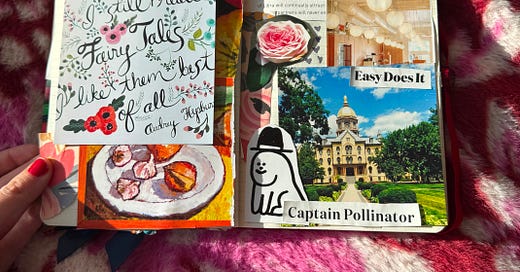Commonplace Books: An Old Practice for a "Brain-Rot" Age
On how Enlightenment era folks made sense of their own "information age", changing culture, and how commonplacing might be the thing that heals our consuming over creating urge
I’m a big fan of a journal, and have loved scrapbooking since I was about 8 years old (I blame my lack of sports talent and that my chore was to cut up scraps of coupons for my mom to earn my allowance). The tactile nature of paper media, but even more broadly with a junk journal, of ephemera that can be made flat and added in between the pages of my little red notebook—this makes me pay a different sort of attention to my life. In a media landscape where our attention spans are the next frontier, practices that bring my attention back to me are valuable.
For a long time, I called my journal a junk journal, and still do at times, because I will put literally anything that strikes my fancy (with delight or disgust) into my notebook. If there’s a will, there’s a way I can glue it in there. However, due to the fact that I read all sort of genres across different time periods, in my recent reading I’ve been re-introduced to the concept of Commonplace books. This is also, naturally, a sequitir others are talking about online and on substack that I’ve seen just a bit of.
As I have learned more about what a commonplace book is, I’ve realized my journaling style may fall readily under this style, and that the history of this style of keeping stock of ideas and feelings is anything but new. Since college, I’ve scribbled down quotes and poems and cartoons from around the internet and whatever book I was reading into its pages, hoping against hope that I’ll be able to recall the gift of that poem or quote when I need it. As an anxious person, I’ve said I need more visual and accessible reminders that silliness and uncertainty are okay, and my journal practices have often been that daily seeking for bits of writing or images that remind me of the world view I wish to hold.
The commonplace book has a long history, coming in and out of intellectual and hobbyist fashion since the 1600s. Its origin story, though, seems to be in response to the felt cultural sense of an overwhelming influx of media—books, print, education, etc, in the Enlightenment period.





